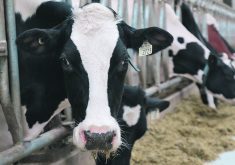Another U.S. industry is standing up for the North American Free Trade Agreement – America’s railways.
In an op-ed published this morning, the Association of American Railroads argued that abandoning NAFTA would be a mistake and that Canada, Mexico and the United States should be looking for ways to improve the trade deal.
“The conversation we need to be having is how do we enhance the NAFTA trading bloc’s capability of competing globally and specifically America’s ability to compete globally,” said Union Pacific chief executive officer Lance Fritz, who was quoted in the opinion piece.
Read Also

Gene editing digs deeper space in Canadian plant breeding
More Canadian research into crop variety development is incorporating gene editing, and one researcher notes that Canada’s regulatory approach to gene editing will help drive innovation
The Association of Railroads released the op-ed before the American Farm Bureau Federation’s annual convention, which will be held Jan. 5-11 in Nashville.
President Donald Trump is scheduled to appear at the event. It’s expected that farmers and producer groups will remind him of the importance of NAFTA to U.S. agriculture.
Trump has threatened to pull the U.S. out of NAFTA, repeatedly describing it as the worst trade deal in history.
Since August, representatives of Mexico, Canada and U.S. have held five rounds of negotiations to modernize NAFTA, but the discussions have been difficult.
A number of trade watchers are concerned the U.S. is on track to terminate NAFTA. American negotiators have put forward proposals that are untenable for Canada and Mexico, such as changing rules of origin around automobile manufacturing so that half of all content comes from the U.S. and introducing a “sunset clause” in which the deal could be re-negotiated every five years.
The railroad association, like many other business groups, said the sunset clause would only cause business uncertainty.
American ag groups have loudly voiced their support for NAFTA over the last few months. Commodity groups and farm organizations have issued hundreds of news releases detailing the economic benefits to U.S. farmers. In November, 168 agri-food groups and Fortune 500 companies such as CHS and Cargill sent a letter to every U.S. governor, reminding state politicians of the importance of NAFTA and the consequences of U.S. withdrawal.
Edward Hamberger, president of the railroad association and author of the op-ed, said the agricultural and railway industries are deeply connected.
“I often see a line of tank cars moving raw goods for input into chemical manufacturing,” Hamberger wrote.
“These trains are going from Canada to Florida, where their contents will help create agricultural fertilizers. Those materials will then move by railroads to the U.S. heartland, helping America’s farmers generate yields.”
Hamberger also cited economic evidence on the value of NAFTA for the railway industry:
• Railroads moved 15.3 million tons of fertilizers and ag chemicals in 2016, much of it across borders.
• Forty-two percent of rail car loads and intermodal units and about 50,000 U.S. jobs are directly association with international trade.
“Less trade means less jobs and less revenues for a host of industries, which means less investment to serve customers and a weakened U.S. economy, Hamberger said.
“The railroad industry stands united with the continued efforts of agriculture advocates to preserve the benefits of NAFTA.”
Contact robert.arnason@producer.com
















